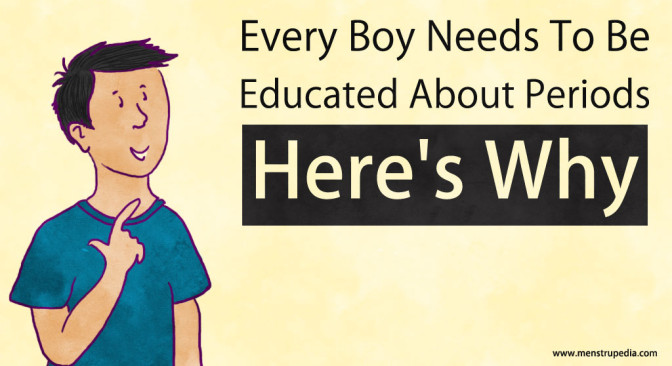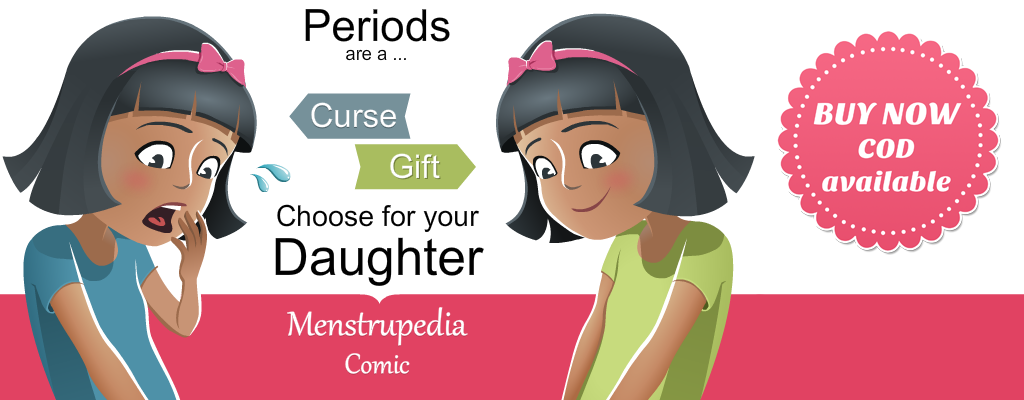Prelude. Ayush’s story.
I had gone to meet my childhood friend, Aahana. While were talking, she suddenly stood up and went to the washroom. After a few minutes, she came out looking a little tensed. I asked her worriedly if something was wrong and she said that nothing was.
As I continued to question her, she texted me saying, “I have my chums”. She realized that I hadn’t understood what that meant. She said,“Ayush, please don’t laugh and please don’t leave me now. I need your help.” What did she mean by that? It scared me. After gathering much courage, I asked her,“Tell me how I can help you.” She replied this time by simplifying so that I could understand –“My periods have just started and I need you to get me some pads. ASAP.” “Ok-kay!” was all that I could get out of my mouth in response.
What am I going to do now? My friend needs my help and I want to help her. But how? How am I going to approach the pharmacist? I don’t have any sister, and my mother has never asked me to buy one for her…
I was jolted back to reality when I heard Aahana shout– “Ayush!” Her face was drenched in sweat. She scribbled something on a small piece of paper and thrusting it into my hand along with some crumpled notes, told me, “Get this for me…and hurry!” I left hastily, totally unprepared for what I had to do. I gave the paper to the pharmacist. He handed me this ‘thing’ wrapped in some paper and in a black polythene cover. Out of sheer inquisitiveness, I asked him, “Why in the black polythene cover?” and he replied awkwardly saying, “This is the way we pack it,” after which I rushed to my friend. I was flustered by everything that was happening since it was my first time. I gave ‘it’ to her and she hurriedly went to the washroom. After she came out and seated herself, there was an awkward silence between the two of us as if she had led me into her private space that was taboo for me to have entered and we both didn’t want to talk about it anymore. After a few minutes, Aahana decided that she wanted to leave. She took an auto instead of the bus since it was beginning to drizzle, but I had my doubts about the real reason behind why she did that. I was left feeling rather puzzled.
A few days ago, I was tagged in a post sharing a short movie on Facebook. It was about a ten-year-old child who came home and told his mother that a girl in his class had peed in her skirt because of which the boys started calling her ‘Acid’. The mother immediately understood that the girl must have had her first period and explained to her son that his friend hadn’t peed and that the nickname that was given to her was a very mean thing to have done. She also decided to go to her son’s school to discuss the idea of educating the school children about this absolutely natural and healthy part of a girl’s life.
What struck me most was that the kid knew that urine was acidic but didn’t know about menstruation! Both are equally important chapters in the science syllabus, yet are discriminated against because of our decadent social system. It is essential that parents and teachers educate the boys too, regarding these changes in girls and women around them and to instill in them a sense of helpfulness and empathy. I remember my teachers avoiding this topic in science class, and my mother changing the topic when asked about the ‘tulonibiya’ (literally, a ‘small marriage,’ a custom in Assamese society which is practiced when a girl attains puberty) of one of my girl-friends. I wish to question this – when in many cultures, the event of a girl attaining puberty is celebrated with such pomp and show, then why is there so much silence in educating boys about this? Why these taboos attached to boys having knowledge of these changes when they should be made equally aware, so that they are able to respect such differences and are able to understand their importance?
A grandaunt had once told me that in olden times, menstruating women were asked to follow certain regulations because of health and hygiene factors. Of course hygienic options of sanitary pads, tampons and menstrual cups were unavailable then. So the rules were actually a way of giving bleeding women some rest and time to maintain adequate hygiene levels. But the dogmatism of a chauvinistic patriarchal society has turned the geniality of a thoughtful society into taboos that bind and oppress women. Progress in science and technology has not been able to liberate our minds from the darkness of ignorance and irrationality.
In Assam, we pray to Ma Kamakhya. The Kamakhya temple is believed to be the place where the reproductive organs of Goddess Parvati had fallen when Lord Shiva was carrying her corpse. In fact, for seven days every year, the temple is closed to the devotees, as it is believed that during this time, the Goddess menstruates. A grand fair known as the Ambubachi Mela is held during these seven days in honour of the fertile Goddess. In Assamese culture, these seven days are referred to as ‘xaatloga’ when Mother Earth menstruates and so no work like tilling and ploughing, etc., are done so as to not hurt Mother Earth. According to some legends, the Kamakhya temple is also believed to be the site where Parvati and Shiva consummated. Again, the Shiv-Linga is a representation of the unification of the reproductive organs of both Shiva (the male) and Parvati (the female), which is symbolic of fertility.
To be precise, [inlinetweet prefix=”” tweeter=”” suffix=”null”]a menstruating woman implies that our friends, sisters and mothers are healthy.[/inlinetweet] It does not render them incapable of doing anything that a man can do. The onus lies on us to educate the younger generations, especially young boys. I say it’s time for secrets to be revealed and taboos to be broken –to educate the younger generation/s about their bodies and on the fecundity of difference.
 Author: Gyanam Saikia
Author: Gyanam Saikia
Gyanam hails from Guwahati, Assam. He has a PG degree in Commerce and is currently pursuing a PGDBM. Passionate about working towards removing the senseless taboos that are rampant in our society, specially affecting women and children, this is his first article and step towards generating awareness by voicing his opinion.
Illustration by Aditi Gupta.








